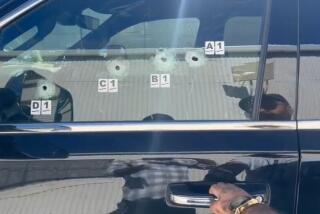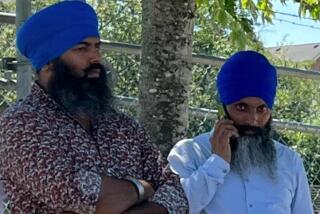Swaran Kaur Bhullar
- Share via
Swaran Kaur Bhullar, 52, emigrated from Kenya in 1988 after falling in love with the San Diego area during an earlier visit to her husband’s relatives. She now is an owner of a video store in Del Mar. Bhullar, a mother of three, is one of an estimated 100,000 Sikhs in California. Her middle name, Kaur, is carried by many Sikh women as a reminder that all people are created equal. She has never been to the Middle East and is a U.S. citizen. But she is, as she puts it, “a brown woman.” She was one of dozens of people of foreign ancestry who were victims of hate crimes in the weeks after Sept. 11. Two men ripped open her car door, slashed her in the head with a knife and shouted: “This is what you get for what you’ve done to us!” She has recovered from her wounds, but she locks the door now when she drives.
*
“I was going to work for the evening shift. About 3:30 I left the house. I was thinking: ‘I’m going to have a nice day. I’m going to do good business.’
I stopped at a traffic light. As soon as I stopped, a motorbike pulled by my side. A guy came from the back. There were two of them. He opened the door. He had something in his hand. When he said, ‘I’m going to slash your throat,’ I think it was a blessing. Had he not told me that, I would have kept my [head] up. When he went for my throat, I went under the steering wheel.
It was so fast. Within 15 or 20 seconds everything was done. At that moment I could not trust anybody. I didn’t think it was advisable for me to go to the side of the road and ask for help. I’m sure that so many people would have helped me at that point. But I drove to my store. My customers, when they saw me, they brought me into the store. Somebody could have just taken my life, so fast. It’s something nobody deserves.
I’m very peaceful here. But after what happened, I thought this place wasn’t safe. I have to take the same route every day. Every single day. I have to pass the same traffic light. There hasn’t been a single day when I don’t remember. When I’m approaching, I’m very, very careful about who is next to me. I especially don’t like motorbikes. I hate them. Every time I look at a motorbike, I’m always looking for [my attackers].
After it happened to me, I just realized that there were such nice people around me. Two bad people cannot spoil the whole thing. I got one letter from the church. Three hundred people signed that letter.
I think [Sept. 11] divided people. I know a lot of Indians, very nice people. I know six or seven ladies who used to wear the outfits that cover their heads. They stopped wearing that. They cannot even pray freely.
I could not give [investigators] a full description. They were asking me, ‘What sort of bike was it?’ I know it was a black bike and that it had some chrome. The only thing I saw was a little hair, reddish-type. I could see that they were not teenagers. Besides that, I could not give them any of the information. The FBI came in here. ‘How come you didn’t take the license plate number?’ ‘What sort of motorbike was it?’ I was trying to figure out if I was alive.
If they were arrested and punished, I would have felt a little better. I feel that they are still free. But it doesn’t bother me. I’m OK. I compare myself to somebody who has lost their kids, or their life. I feel that I am safe and that I am going to be fine.
Here, if something happened and I picked up the phone and called 911, a cop would come to my place at once. If I was back home in Kenya, for three days nobody would come. Seriously. They would say, ‘Well, we don’t have gas in the car.’ That is what happens in Kenya. Everybody should be happy about what God has given them. We have a beautiful country here. Everybody should mind their own business. They should not think about fighting.”
*
As told to Scott Gold
More to Read
Sign up for Essential California
The most important California stories and recommendations in your inbox every morning.
You may occasionally receive promotional content from the Los Angeles Times.













